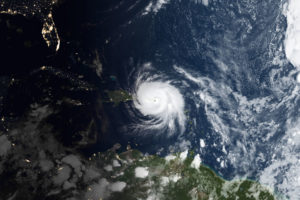
By Katherine Coble || News Editor
The American territory of Puerto Rico is struggling to respond to the major damage done by category-four storm Hurricane Maria last week. Wind and rain devastated the small island nation, home to nearly 3.5 million American citizens. According to NBC News, Maria is the largest hurricane to strike the island since the early 1900s. The death toll so far is 13, though Puerto Rican government officials say the toll could rise in the coming days as more information comes in from isolated areas.
One of the biggest concerns facing Puerto Rico is their lack of electricity. Hurricane Maria has left the nation’s power grid in pieces. The mayor of San Juan, the territory’s largest and capital city, said in an interview with MSNBC that power could be out across the island for a stunning four to six months. Prior to the storm, Puerto Rico was struggling with a relatively poor infrastructure with low staffing. Now that Maria has struck the island, the electric grid is in serious disrepair. Although cell phone communication was re-established on the afternoon of Thursday, September 21, the residents of Puerto Rico are still grappling with their lack of power, an issue which does not appear to be leaving them any time soon.
Hurricane Maria was so powerful that it broke two National Weather Service radars. Flooding blocked major highways and roads for days, making travel difficult in some parts of the island and impossible in others. Several feet of rain had fallen onto the island by Thursday evening, with weather reports calling for an additional eight inches of rain through Saturday the 22nd. A federal state of emergency has been declared on the island and the governor Governor Rosselló announced a nighttime curfew on the island to last until the end of last week. According to The New York Times, Governor Andrew M. Cuomo of New York state is expected to visit the island and assist with recovery efforts. President Trump has also announced his intention to visit but has not provided details on when he anticipates the trip happening.
Residents of Puerto Rico are concerned about the long-term impact Hurricane Maria will have on their home. The territory was already coping with the impact of Hurricane Irma, which did not affect Puerto Rico as badly as other Caribbean nations but still left most of the country without power. There remain issues with maintaining steady communications around the island and with the mainland United States. Furthermore, residents worry that they will be neglected in recovery efforts due to the multiple major hurricanes that have already hit the United States and its territories in the past month. Puerto Rico’s tourism-based economy is now in serious peril in addition to countless numbers of residents being left without proper shelter or food. The coming months will be incredibly testing for an island nation which already struggled with a bankruptcy crisis, the Irma recovery efforts, and the island’s physical isolation from the federal government in the mainland United States. Only time will tell how Puerto Rico – and every community impacted by natural disasters in the past month – recovers from the devastation.
Sophomore Katherine Coble is the news editor. Her email is kcoble@fandm.edu.